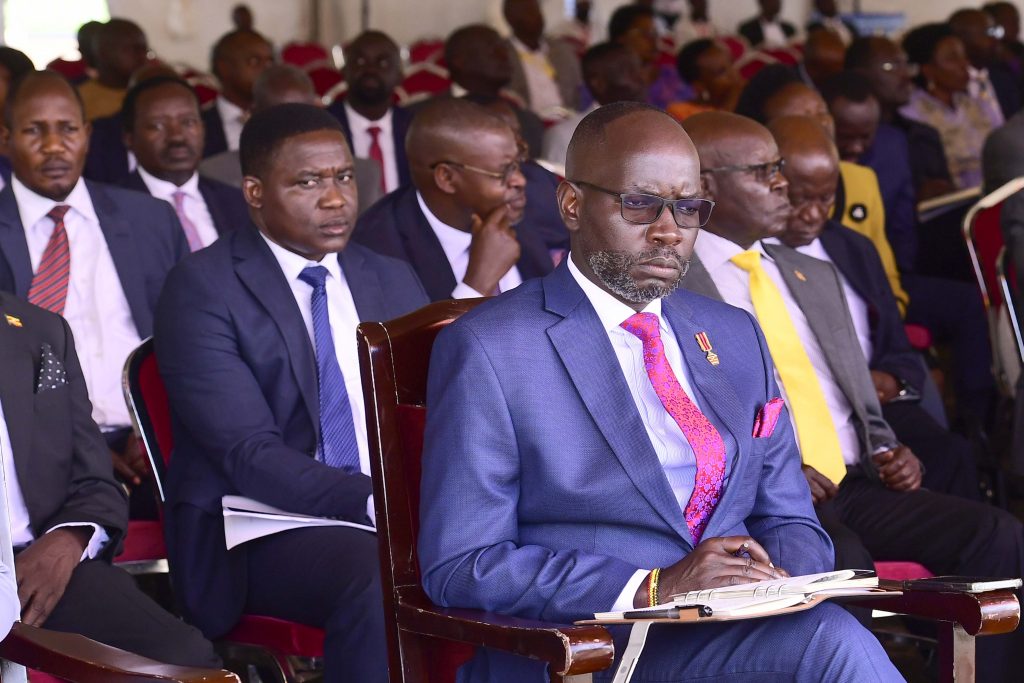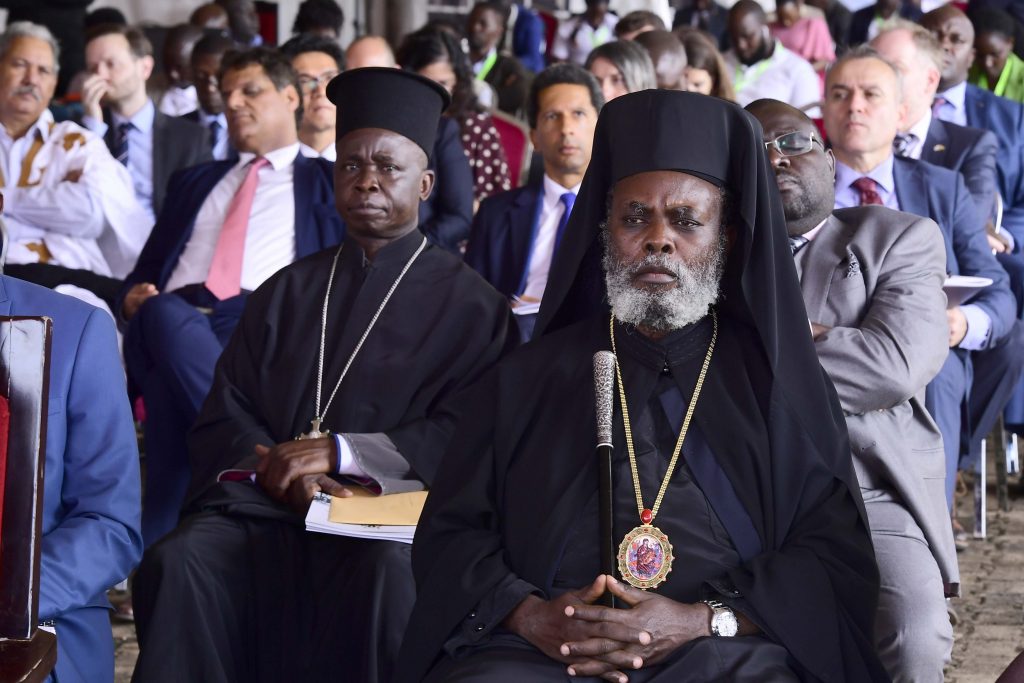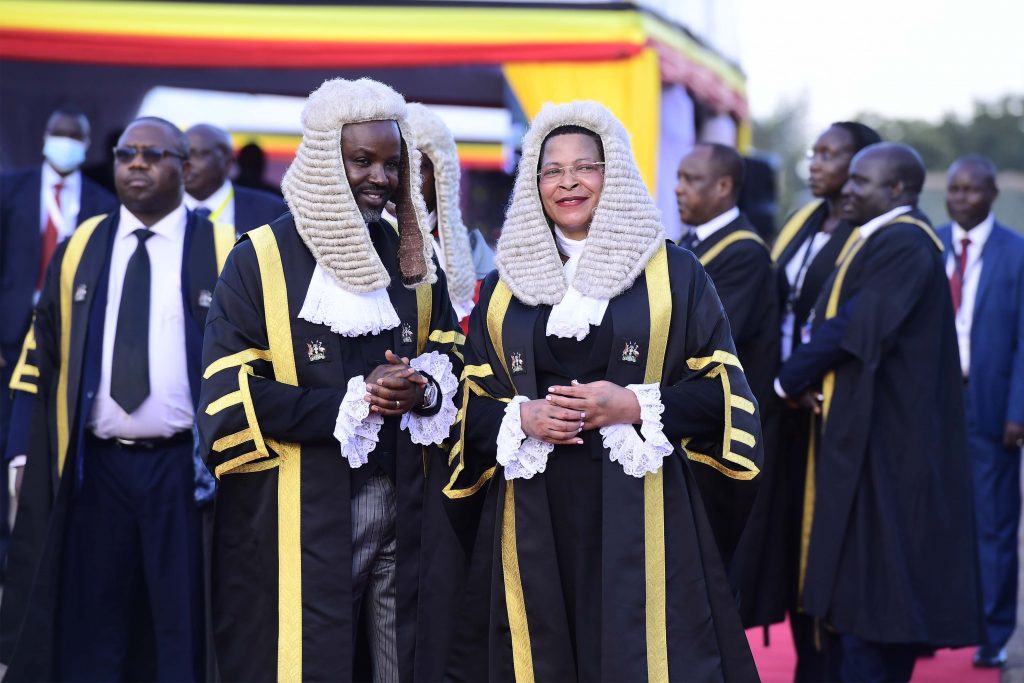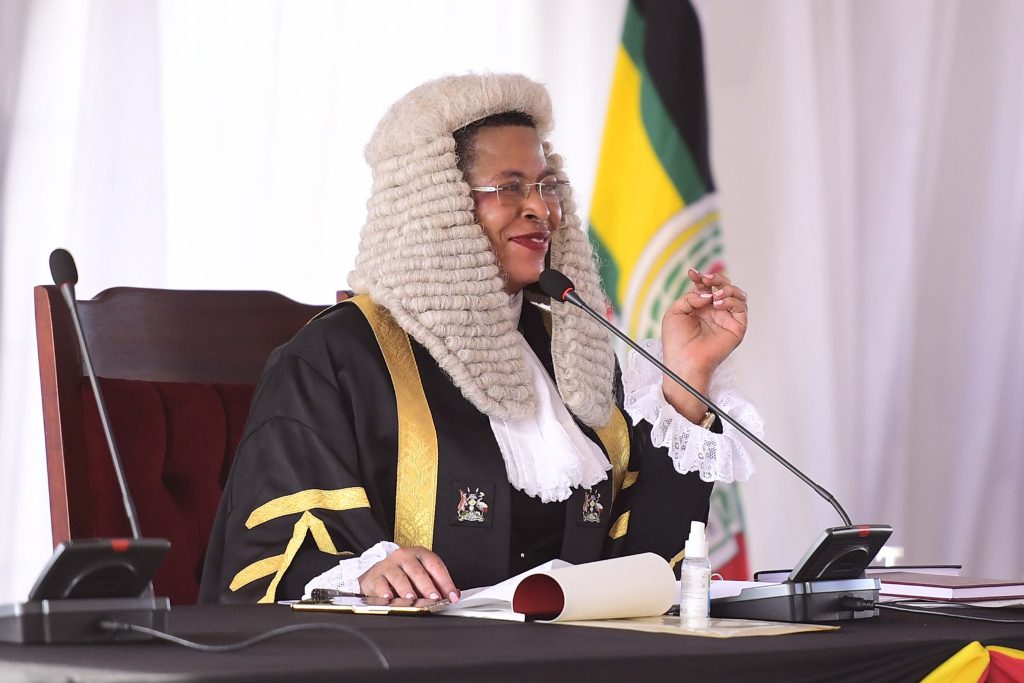Ahead of the 2023/2024 financial year, the government will focus on 11 priorities to ensure a stable economic growth of the country, President Yoweri Museveni has revealed.
In his State of the Nation Address to Parliament sitting at the Kololo Independence Grounds on Wednesday, President Museveni reported that the economy is projected to grow at average of 6.5 to 7.0 percent per year in the next half decade which would present an improvement from the current year’s projection of 5.5 percent. Currently, Uganda’s economy is standing at $49.4b (about Shs184.6 trillion).
With the country expecting to receive the national budget of Shs52 trillion next week, the President listed the economic development priorities for the next financial years as peace and security of persons and property; effective implementation of the Parish Development Model (PDM); kickstarting construction of Standard Gauge Railway (SGR) and finalizing rehabilitation of Meter Gauge Railway; investing in small scale solar-powered irrigation to address climate change and food insecurity; construction of transmission lines and power sub-stations and, developing industrial parks to ease manufacturing.
Others are maintenance of both tarmac and murram roads; supporting medical schools and science-based research and development; expediting the development of infrastructure for oil and gas production; capitalization of Uganda Development Bank (UDB) and Uganda Development Corporation (UDC) and supporting information, communication and technology development.
“As a result of the NRM Government’s deliberate efforts to expand the economic base of the Country, a strong foundation has been built for rapid economic growth and socio-economic transformation. In 1986, when the NRM Government took administration of the Country, the size of our economy was equivalent to US$ 1.5billion. Today, our economy is about US$ 49.4billion. In other words, the economy has expanded by more than 30 times since 1986” Museveni said at the opening of his speech.
Sector priorities
Uganda Revenue Authority is expected to collect at least Shs29 trillion shillings next year with the rest of the resources planned to be generated from domestic refinancing and external borrowing, there seems to be a lot of priorities compared to the planned outputs by the government in its development budget. The President in his address tackled key sectors that will be invested in to ensure that the country which like others are recovering from economic shocks orchestrated by Covid-19 realises a stable growth.

Healthcare in Uganda has of recent been subject to national concern and Ugandans on social media went ahead to do photographic exhibitions of the different health facilities especially regional referral hospitals and general hospitals showing the status of the infrastructure and equipment something that did not go well with officials in the Ministry of Health. There are also growing tensions over the delayed deployment of medical interns and also arrears for those who completed their internship.
The President nevertheless, reported that since the outbreak of Covid-19, the Government has strengthened health systems in a move that has seen significant installation of key equipment in regional and national referral hospitals.
As a matter of priority, Museveni said that the government will beginning with the next financial year focus on; timely supplies of drugs and relevant equipment; support prevention of noncommunicable diseases through immunization; operationalize Mulago Super Specialised Hospital and expediting the construction of Lubowa Specialised Hospital; focus on supervision and accountability; sensitise Ugandans on nutrition and hygiene and, prevention of malaria.
About three months ago, the Ministry of Health requested Shs2.7b for the supervision of the construction works of the Lubowa. There remains concern over the delayed competition of the project for which Parliament in 2019 approved $379m (about Shs1.4 trillion then) for the construction of the 264-bed capacity project whose contractor is Italian Investor Enrica Penetti’s company, Finasi/Roco Construction Ltd.
It is about 25 years since the government embarked on the implementation of the Universal Primary Education (UPE) and later on the introduction of Universal Secondary Education (USE), the President continues to reiterate the policy on free education in government aided schools. In his address, Museveni insisted that no child should miss classes on account of lack of school fees.
“It is, therefore, unacceptable for school authorities to demand fees from poor parents. Government will not tolerate this practice. Education must be totally free in government schools. The local government leaders must enforce this when we give them renewed orders after an internal review to find out what have been the obstacles hitherto” he warned.

The President who reported to the country that the current literacy levels stand at 76 percent listed the priorities in the sector as promoting science, technology, engineering and mathematics; enhancing the technical capacity and skills to support industrial growth; electronic tracking of enrolment, drop-out and teachers; improving overall staffing levels and, developing of complete National Vocational Qualifications Framework.
“With our oil money, we shall be able to complete our targets of a Government primary school per parish and a Government secondary school per Sub-County” he said.
Most of the investments being attracted in Uganda are in the area of industrialization and this has led to the upsurge in production of products like steel, plastics and pharmaceuticals among others. However, for industrialization to thrive, it needs a performing energy sector.
Concerning energy, the President pointed out that if the key priorities are achieved, this sector will propel the expansion of the size of the economy from the projected $55b by the end of next financial year to $550b in a short term.
He said that Uganda’s electricity generation capacity will hit 1800MW by the end of 2023 with the completion of Karuma power dam and this will power the industries. Therefore, in the immediate future, the government wants to prioritise investment in rural electrification to cover all sub-counties of Uganda; connecting all industrial zones and factories; constructing more substations; and, strengthening the capacity of Uganda Electricity Generation Company Limited (UEGCL) and Uganda Electricity Distribution Company Limited (UEDCL) in order to be efficient at the departure of investors, Eskom and Umeme.
To Museveni, abundance of electricity will play a big role in the fight against exportation of raw products which has been enriching the foreigners at the expense of Ugandan farmers and miners.
Still in the energy and mineral development sector, Museveni emphasized that the infrastructure is being put in place to ensure that the first oil flows by 2025. On this he plans to meet with Petroleum Authority of Uganda and the Oil Companies to “harmonise so that we don’t miss the target of 2025 as the first oil date”
On infrastructure development, the President reported that the priorities in the coming financial year will be put on the maintenance of existing tarmac roads and also the upgrading of murrum roads where each District in Uganda has been allocated Shs1b in the budget.
The Government, the President said, will also prioritise infrastructure that supports industrialization, production of oil and gas and promotion of tourism. Without making mention of the potholes that have made Kampala roads a menace to motorists, Museveni hinted that that roads in urban areas will be prioritized for maintenance.
Agriculture and its products
Uganda continues to be among the several African countries that have not yet fulfilled the allocation of at least 10 percent of their national budgets to Agriculture as per the Maputo Declaration of 2003. With the lion’s share of the budget going to the Governance and Security programme and the Integrated Transport Programme, the country however continues to make strides in agriculture according to the President.
In his address, Museveni said that the sector contributes which contributed 24.1% of Gross Domestic Product (GDP) grew by 4.4% in the FY 2021/22 as compared to 4.3% in the FY 2020/21 while the value for the exports also grew by 24% from $1.6b in FY 2020/21 to $2.085b in FY 2021/22. He said that the growth was attributed to the increased volumes and quality of coffee, dairy, fish and tea.
“To take some examples, the volume of coffee produced increased by 5% from 8.06 million (60 kg) bags in FY 2020/21 to 8.45 million (60 kg) bags in FY 2021/22. This is on account of government interventions such as generation and distribution of improved coffee variety seedlings, increased use of water for irrigation and promotion of use of fertilizers. The volume of exports increased from 6.08 million (60kg) in the FY 2020/21 to 6.3 million (60kg) bags in the FY 2021/22, an increase of 3%. The value realized from coffee exports increased by 58% from $544M in 2020/21 to US$ 862M in 2021/22.”

The President also reported a tremendous rise in the production of milk which he said hit 193 percent in the 2021/22 financial year with the farmers selling up to 5.5b litres compared to 2.81b litres in the previous year. Museveni who recently struck deals for milk exports to Algeria has commended the private sector players in the dairy industry for complying to the quality standards and regulations issued by the Ministry of Agriculture. Still from the dairy industry, Uganda earned Shs2.9 trillion from export of 247,234kgs of beef in 2022 compared to Shs1 trillion in 2021.
During the 2021 campaigns, President Museveni informed Ugandans of his plans to develop the fishing industry. While campaigning in Kumi District in November 2020, Museveni said that the Ministry of Agriculture, Animal Industry and Fisheries has a masterplan to make the fishing industry earn Uganda more than what Saudi Arabia earns from its Oil and Gas sector. Saudi Arabia state-controlled oil company Aramco reported in 2022 that the gulf country had earned $161b from oil and gas.
Now, Museveni in his address on Wednesday did not make mention of the masterplan but informed the country that the fish catches from all the water bodies increased from 621,987 metric tons valued at Shs1.875 trillion in 2021 to a total catch of 651,719 metric tones fetching Ugandans an income of Shs1.968 trillion in 2022.
“The availability of raw materials (fish), sustained operations of the 12 fish processing factories. The performance has been a result of government focus on gazetting of fish breeding grounds, enforcement of fisheries laws and regulations, provision of quality fingerlings and fish feed and providing an enabling environment for the private sector to invest in aquaculture. The value of fish and fish products exported increased by 27.7% from $148.7 million in FY 2020/21 to $156.4 million in FY 2021/22” Museveni explained.
Tourism
Tourism continues to be one of the leading foreign exchange earners for the country but in the new budget, there were calls to increase the funding so that more promotions and developments are made to make Uganda more attractive to the rest of the world. To the President, the sector has “significant potential for the economy” because Uganda has the best sites including all the national parks that continue to attract tourists.
He revealed that, despite the global lockdown due to Covid-19 pandemic, Uganda received a half a million tourists in 2021 leading to a revenue of $530m and by December 2022 when most of the countries had lifted travel bans the numbers rose to 814,508 while the earnings hit the $1b mark.
As a way of improving the sector further, the President listed critical roads that will be upgraded or constructed to link to the national parks and game reserves so that the tourists can easily access the animals they mainly visit Uganda to see. He also said that there is need to upgrade aerodromes in key strategic areas to Airport status to ease the overreliance on Entebbe International Airport with the soon to be completed Kabaale International Airport in Hoima District.
“We also need to build new Airports near tourism destinations such as Kidepo, Bwindi and Kasese. Tourists, especially the rich people, don’t have to come land at Entebbe and drive to Kidepo for seven hours. They want to land, see the animals and then go away. Airports are also good for tourism.” The President said.
Neighbours Kenya and Tanzania have boosted their tourism sectors by constructing Airports that allow landing of intercontinental flights in strategic tourism areas. A key example is the Kilimanjaro International Airport in Tanzania that was strategically built to ease access of tourists to Mount Kilimanjaro.
Other issues
The President reechoed his April address to Parliament by making emphasis on the implementation of the Parish Development Model where Shs1.5 trillion has so far been disbursed to parish Savings and Credits Cooperative Societies (SACCOs) to be accessed by 39 percent of the population that has not yet reached the money economy. He also emphasized the fight against corruption, a vice which like other poverty alleviation programmes has already hit PDM at its initial stages.
Museveni also emphasized the need for strategic security to provide a conducive environment for local and foreign investments. On this he gave accountability of the Operation Shujja that saw the Uganda Peoples Defence Forces (UPDF) jointly carry out operations with the Democratic Republic of Congo army to pursue the Allied Democratic Forces (ADF) rebels. The President also directed that no Kenyan Turkana herdsman should be allowed to enter Uganda with a gun because they have in turn used them to steal cattle from the Karimajog hence causing unending insecurity in the area.
Legislation
Meanwhile, Speaker Anita Among expressed concern on the slow pace at which the government has been acting on the legislation agenda that the President presented at last year’s State of the Nation Address. Museveni on June 7, 2022 listed 62 proposed Bills that the government planned to introduce in Parliament but most of them have not been tabled.

Mr President at the State of the Nation Address last year, you listed 62 items comprising the government legislative agenda. Fifty-five were bills while others were reports. I wish to report that only 17 Bills were presented representing barely 31 percent,” said the Speaker.
She argued with the Prime Minister and Leader of Government Business, Robina Nabbanja and the Government Chief Whip to ensure that business is always brought to the House in time for processing so that the government achieves its legislative agenda.
The Speaker also informed the President that in the second Session of the 11th Parliament which comprised 105 sittings; 38 Bills were passed while 39 resolutions were passed too 10 of which being granting of leave to private members to introduce Bills. Also, Parliament considered 67 reports, three petitions, 73 Ministerial statements, seven personal statements by members and seven statements by the Leader of the Opposition.
The signature legislation in the second Session of Parliament was the passing of the controversial Anti-Homosexuality Bill which after returning it for fine tuning, the President signed it into law last month in an action that sparked mixed reactions across the world.
Museveni who commended Parliament for considering and passing government Bills also made his intentions clear in the fight against homosexuality leading to the recent signing of the Anti-Homosexuality Bill, 2023. The President who has not been shy of commenting against the global campaign for rights of the LGBTQI+ community in Uganda clarified that the recently enacted law is not fighting victims but is against promotion, recruitment and performance of homosexual acts.
Museveni said that the law fights a homosexual who recruits other people who are not “psychologically disoriented” by misinforming or bribing them or someone who forcefully engages another in same sex acts.
The law provides for 20 years jail sentence for one convicted for promoting homosexuality and death sentence for a person who commits aggravated homosexuality.
In allaying the fears of the international community from visiting Uganda if they are members of the LGBTQI+ community, the President said that his problem is with those who go public on their sexual orientation and tend to lure others into such.

“Additionally, in Uganda, sex is confidential, even heterosexual sex. Therefore, if a homosexual keeps his being to himself or confidentially seeks assistance from the doctors or priests, it will not offend this law. I have told our MPs that if there are still some illogicalities in the law, such as forcing employers to know who is a homosexual in the company or landlords to know which tenants are homosexuals, we shall work to amend them and keep the substance. Therefore, doctors and other health providers should assist those patients who come to them bearing the three substantive points in mind.”
He promised to address the nation through broadcast media by the end of June to explain to Ugandans exhaustively the country’s stand in the fight against homosexuality and how the law will be enforced.
Speaker, Among, allegedly had her American visa cancelled last month after White House learnt of the developments in Uganda following the assenting of the law by President Museveni.